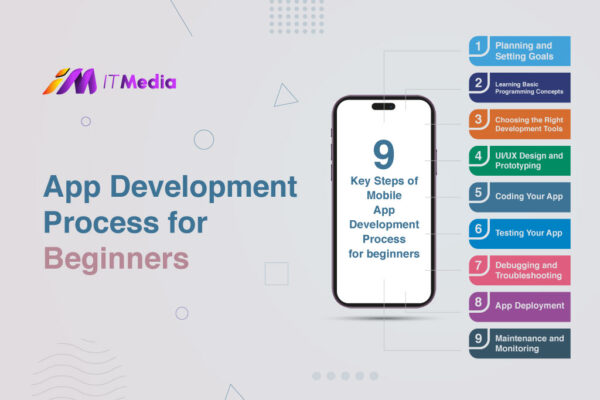
The mobile app industry has grown dramatically in recent years due to the increase in smartphone dependence.
As the demand for innovative applications increases, understanding the app development process becomes more important, especially for those new to the field
In this article, we will guide you through the nine steps of the mobile app development process for beginners.
9 Key Steps of Mobile App Development Process for beginners
1. Planning and Setting Goals
Before entering the development phase, it is important to define your app’s purpose and target audience.
Identify key features and functionalities that align with your goals, ensuring a clear roadmap for the development process.
2. Learning Basic Programming Concepts
Application development requires a basic understanding of programming languages. Beginners should look into languages like Swift (iOS) and Kotlin/Java (Android).
Swift is known for its simplicity and readability, making it an excellent starting point for iOS development, while Kotlin and Java are widely used on Android.
Now that we’ve covered the initial stages, let’s dive into the next steps of the app development process for beginners.
3. Choosing the Right Development Tools
Familiarize yourself with popular app development frameworks such as React Native and Flutter, which allow you to quickly create cross-platform apps.
Integrated development environments (IDEs) such as Xcode (iOS) and Android Studio (Android) offer full coding and testing capabilities.
4. UI/UX Design and Prototyping
Plan your app’s user interface (UI) by creating wireframes and prototypes. Tools like Sketch and Adobe XD help visualize app layouts and user interactions, facilitating better communication between developers and designers.
Now, let’s move forward and explore the subsequent phases of the app development process for beginners.
5. Coding Your App
Follow the step-by-step guide to coding a basic app, making sure to adhere to best practices Tips for writing clean and efficient code include proper documentation, modularization, and version control.
6. Testing Your App
Testing is an integral part of the app development process. Understand the importance of unit testing, integration testing, and user testing to identify and resolve issues before final release.
7. Debugging and Troubleshooting
Confront and resolve common issues faced by beginners using debugging tools and techniques to improve app stability and performance.
8. App Deployment
Prepare your app for launch by following a systematic deployment process. Navigate through the App Store and understand the submission process, ensuring compliance with guidelines for a successful release
As we approach the final phases of the app development process, let’s explore the concluding steps.
9. Maintenance and Monitoring
Recognize the value of app maintenance and updates in meeting changing user needs and developments in technology. Gather user feedback for continuous improvement and future updates.
Conclusion
Finally, learning the app development process for newbies requires an in-depth knowledge of the fundamental steps as well as continuous learning. Remember important milestones and inspire young programmers to experiment and innovate in this dynamic field.
Remember, the app development journey for beginners is exciting, with plenty of opportunities for growth and creativity. Stay curious, keep learning, and create apps that influence the future!
FAQs
1. What is the app development process for beginners, and why is it important?
Understanding the app development process is crucial for beginners to navigate the intricacies of creating mobile apps. It provides a structured approach to turning ideas into functional and user-friendly apps.
2. Which programming languages are recommended for beginners in app development?
For beginners, Swift for iOS and Kotlin/Java for Android are highly recommended programming languages. They offer a balance of simplicity and functionality, making the learning curve more manageable.
3. How do I choose the right development tools for my app?
Explore popular app development frameworks like React Native and Flutter. Also, understand the importance of integrated development environments (IDEs) like Xcode and Android Studio in the development process.
4. Why is wireframing and prototyping important in app development for beginners?
Wireframing and prototyping help beginners effectively plan an app’s user interface (UI), providing a visual representation of the app’s layout and interactions before diving into coding.
5. What are the key steps in coding a basic app for beginners?
Coding a basic app involves a step-by-step process. Beginners should focus on proper documentation, modularization and version control, ensuring clean and efficient code.
6. Why is testing essential in the app development process for beginners?
Testing is important to identify and resolve issues before the app’s final release. Newbies should understand the importance of unit testing, integration testing and user testing to ensure app functionality and stability.
7. How can beginners troubleshoot common issues in app development?
Learn about common problems faced by beginners and effective troubleshooting techniques. Use debugging tools to quickly fix issues and improve the overall performance of the app
8. What is the deployment process for apps developed by beginners?
Understand the steps involved in preparing an app for launch, including compliance with App Store guidelines. Gain insight into the submission process for a successful deployment.
9. Why is post-development maintenance crucial for beginner-developed apps?
Post-development maintenance ensures that apps remain relevant and functional. Know the importance of collecting regular updates and user feedback for continuous improvement.
10. Where can beginners find resources for continuous learning in app development?
Explore recommended books, courses, and online resources for continuous learning in app development. Join communities and forums to connect with experienced developers, ask for advice and share experiences.